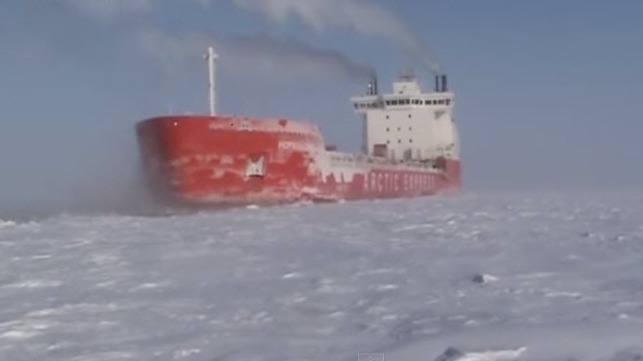NGOs Urge IMO to Immediately Ban Black Carbon Fuels in the Arctic

The Clean Arctic Alliance, an international coalition of 21 non-profit organizations, is calling on the International Organization to take the bold step this week of immediately banning ships from using heavy fuel oil in the Arctic. According to the groups after years of wrestling with what to do about black carbon emissions, the IMO’s Pollution Prevention and Response Sub-Committee should accelerate the efforts to reduce climate-warming emissions by mandating an immediately ban at its meetings this week. By requiring a switch to cleaner distillate fuels in the Arctic they believe black carbon emissions could be reduced by 44 percent..
“This week the IMO has the opportunity put in place rapid and effective regulations to protect the Arctic and the global climate from the warming impacts of black carbon emissions, by obliging vessels operating in the Arctic to switch to cleaner shipping fuels”, said Dr. Sian Prior, Lead Advisor to the Clean Arctic Alliance. Mandating a switch of fuels in order to cut black carbon emissions in the Arctic would be an easily-won victory for both the IMO and the shipping industry, and put the sector on course towards decarbonization.”
According to the groups, the IMO’s proposed ban due to be approved in June and to go into effect in mid-2024 “contains serious loopholes which will mean minimal reductions in the use and carriage of HFO when implemented.” The IMO in November 2020 approved a ban on the use and carriage of HFO in the Arctic. Deferring action for three years they say will likely lead to an increase in HFO use and carriage in the Arctic with continuing growth till mid-2029 when the exemptions would be closed.
In making their call for action the groups cited scientific reports that suggest that climate change is having a more rapid impact in the Arctic than anywhere else right now. They said that increased winds in the global jet stream contributed to the polar low pressure areas that shifted south such as the one that set new records in Texas.
Black carbon from shipping they contend is especially damaging in the polar regions. Although shipping only contributes two percent of the black carbon in the Arctic, it has a much greater heating impact than other sources of black carbon which are higher in the atmosphere with less chance of falling on ice and snow. When emitted by ships in and near the Arctic, black carbon particles enter the lower levels of the atmosphere, where it remains for under two weeks, absorbing heat. When it eventually comes to land on snow or ice, black carbon’s warming impact is 7 to 10 times greater.

that matters most
Get the latest maritime news delivered to your inbox daily.
The scientific data they reported says that shipping’s emissions of black carbon have risen eight percent globally in the past decade, but in the Arctic, it has risen by 85 percent between 2015 and 2019. They point to the on-going increase in the amount of shipping passing through the Arctic citing data published by the Arctic Council that shows a 25 percent increase in shipping traffic and a 75 percent increase in the total distance sailed in the Arctic between 2013 and 2019.
“At PPR 8, the IMO should put in place regulations to ensure the shipping industry switches to distillate fuels, such as diesel or marine gas oil (MGO), or other cleaner energy sources, for vessels operating in or near the Arctic. Also, vessels using diesel or MGO should be required to install and use particulate filters, as are already required by land-based transport. Such a move could be led by the shipping industry – an act which would bolster confidence that the sector is serious about staying the course towards decarbonization,” concluded Prior.
